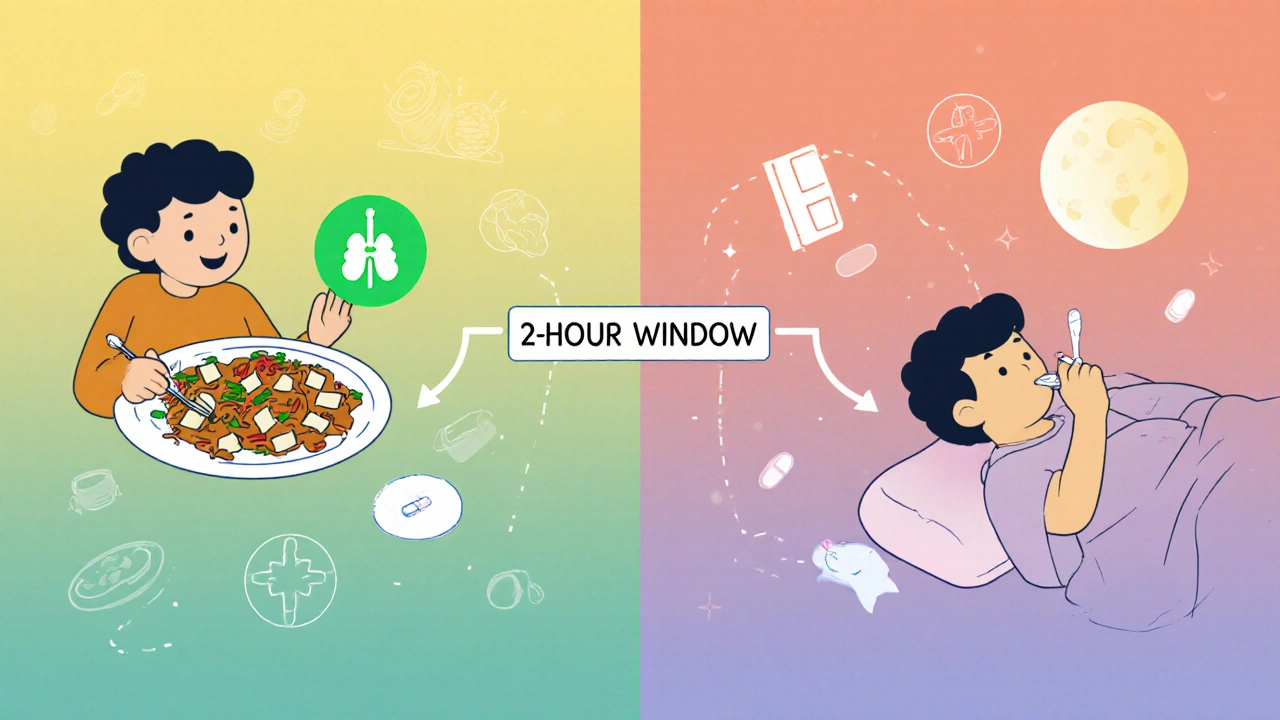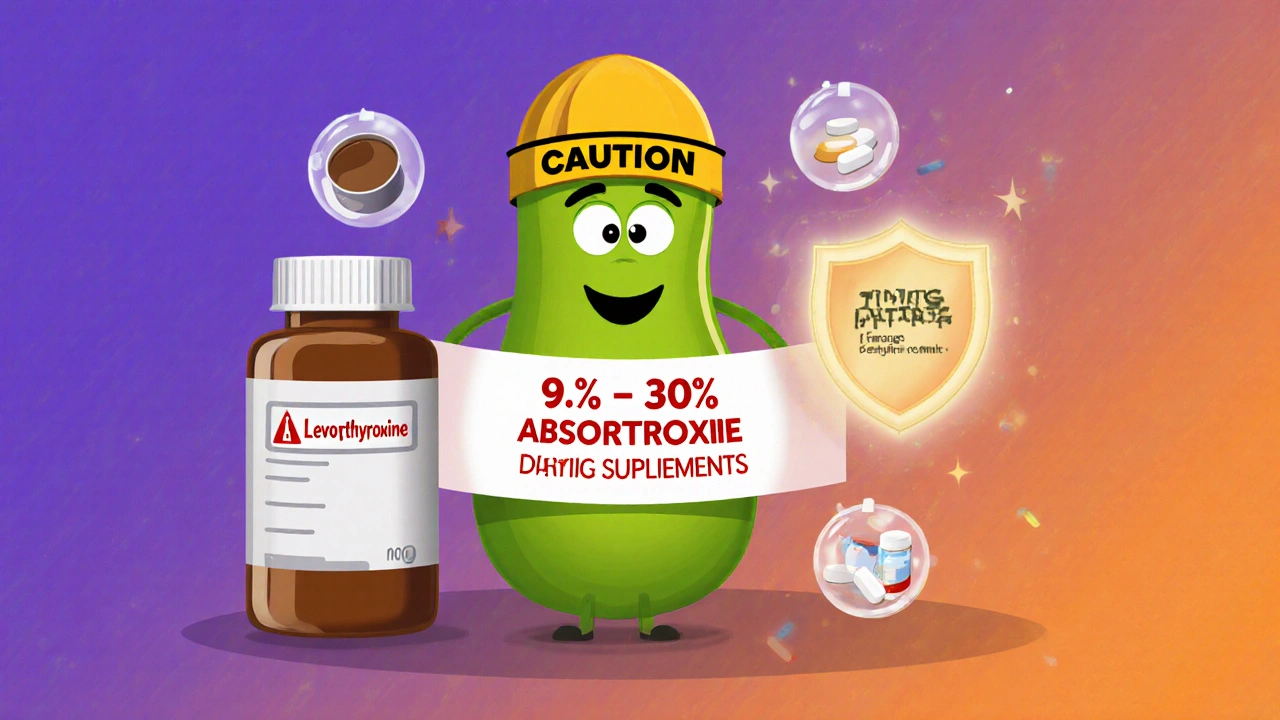22 Nov 2025
- 9 Comments
If you're taking levothyroxine for hypothyroidism and you love tofu, soy milk, or edamame, you're not alone. Millions of people do. But here’s the problem: soy can mess with how well your thyroid medication works. It doesn’t mean you have to give up soy entirely. It just means you need to know when to eat it - and when not to.
Why Soy Interferes with Thyroid Medication
Soy contains compounds called isoflavones - mainly genistein and daidzein. These aren’t harmful on their own. In fact, they’re linked to health benefits like lower cholesterol and reduced menopause symptoms. But when they meet levothyroxine in your gut, they bind to it. Think of it like soy proteins acting like little magnets, pulling the medication away from where it needs to be absorbed. This reduces how much of the drug actually enters your bloodstream. Studies show this interference can drop levothyroxine absorption by 9% to 30%. That’s not a small number. If you’re taking 100 mcg of medication and only absorbing 70 mcg, your body isn’t getting what it needs. Your TSH levels rise, your energy drops, and you might feel worse - even if you’re taking your pill every day. This isn’t just theory. In the 1960s, doctors noticed babies on soy formula needed much higher doses of levothyroxine to stay healthy. Fast forward to today, and we see the same pattern in adults. A 2006 case study followed a woman who had her thyroid removed. She was taking 200 mcg of levothyroxine daily - unusually high - because she drank soy protein shakes right after her pill. Once she stopped, her dose dropped to 125 mcg. Her body finally absorbed the medication properly.How Much Soy Is Too Much?
Not all soy is created equal. Whole soy foods like tofu, tempeh, edamame, and soy milk have the strongest effect. That’s because they contain both protein and isoflavones in natural combinations that bind tightly to levothyroxine. Soy isoflavone supplements? Less of a problem. One study showed they caused only a 9% drop in absorption - compared to 30% with whole soy. Still, it’s not zero. If you’re popping soy pills for menopause or muscle growth, you need to be careful too. Even fiber supplements like psyllium can interfere - but soy is worse. Calcium and iron are the biggest offenders, cutting absorption by up to 36%. Coffee knocks off about 20%. Soy sits right behind them on the list of dietary disruptors. The good news? If you’re not on thyroid medication, soy doesn’t harm your thyroid. A 2019 meta-analysis of 3,600 people found no change in free T3 or T4 levels in healthy individuals, even with daily soy. The issue is only for people who rely on medication to replace what their thyroid can’t produce.Timing Is Everything
The biggest mistake people make? Eating soy at the same time as their pill. That’s when interference peaks. Here’s what experts now recommend:- Take levothyroxine on an empty stomach with a full glass of water.
- Wait at least 60 minutes before eating or drinking anything else - including coffee, juice, or breakfast.
- Wait 2 to 4 hours before consuming soy products.

Alternative Strategies
Not everyone can wait hours after taking their pill. Some people work early shifts. Others have kids to feed. Here are two proven alternatives:- Take your pill at bedtime. If you eat dinner at 6 p.m. and take your pill at 10 p.m., you’ve already passed your last soy meal. Just make sure you haven’t eaten anything else in the last 2-3 hours. No late-night soy yogurt or soy ice cream.
- Be consistent. If you take your pill at 7 a.m. every day and avoid soy until noon, your body learns the pattern. Fluctuating your routine - sometimes taking it with breakfast, sometimes at night - confuses your absorption. Stability matters more than perfection.
Real People, Real Results
Reddit’s r/Thyroid community is full of stories. One user, HypoWarrior42, started drinking soy milk every morning with her breakfast. Three months later, her TSH jumped from 1.8 to 5.2. Her doctor increased her dose from 75 mcg to 100 mcg. She switched to almond milk and waited 3 hours after her pill before having soy - and her TSH dropped back to 1.9. But not everyone has the same experience. Another user, SoyLoverHypo, has taken Synthroid with soy milk for five years. Her TSH stays at 1.5. Her endocrinologist says her timing is perfect - she takes her pill at 6 a.m. and eats soy at noon. Her body absorbs the medication fine. The takeaway? It’s not about soy. It’s about timing. And your body’s response might be different from someone else’s.What About Vegans and Vegetarians?
About 74% of plant-based eaters with hypothyroidism say their doctor talked to them about soy and medication. That’s up from 42% in 2015. As soy consumption grows - the global soy food market hit $16.2 billion in 2022 - doctors are paying more attention. If you’re vegan or vegetarian, you don’t have to give up your diet. Just plan ahead. Swap soy milk for oat or rice milk in the morning. Have tofu at lunch, not breakfast. Eat tempeh in your stir-fry after your 3-hour window. Soy isn’t the enemy - poor timing is.
What Else Interferes With Levothyroxine?
Soy isn’t the only thing to watch for:- Calcium supplements - wait 4 hours
- Iron supplements - wait 4 hours
- Coffee - wait 60 minutes
- High-fiber foods - wait 2-3 hours
- Antacids - wait 4 hours
Final Rule: Test, Don’t Guess
The only way to know if soy is affecting you is to check your TSH. If you start eating soy regularly and your TSH climbs above your target range (usually 0.5-3.0 mIU/L), it’s likely the soy. Wait 6-8 weeks after changing your routine, then get tested again. Don’t adjust your dose on your own. Talk to your doctor. They might suggest a different timing strategy before changing your prescription.Bottom Line
You don’t need to quit soy. You just need to separate it from your medication by 2-4 hours. That’s it. For most people, that small change is enough to keep TSH levels stable and avoid unnecessary dose increases. The science is clear. The advice is simple. And the results? They’re worth the wait.Can I eat soy if I take levothyroxine?
Yes, you can eat soy. You don’t need to avoid it completely. The key is timing. Wait at least 2-4 hours after taking your levothyroxine before consuming soy products like tofu, soy milk, or edamame. This allows your body to absorb the medication properly.
Does soy cause hypothyroidism?
No, soy does not cause hypothyroidism in healthy people with normal thyroid function and adequate iodine intake. Studies show no significant changes in thyroid hormone levels in euthyroid individuals who consume soy. The concern is only for people who rely on levothyroxine to replace thyroid hormone - soy can reduce how well the medication is absorbed.
How long should I wait after taking thyroid medication before eating soy?
Wait at least 2 hours for most adults. For children, infants, or if you’re taking high amounts of soy, wait 3-4 hours. Recent research shows that 2 hours is often enough to prevent significant interference, but consistency matters more than the exact number. Stick to one routine - either morning dosing with delayed soy, or bedtime dosing.
Can I take levothyroxine at night instead of in the morning?
Yes, taking levothyroxine at bedtime is a common and effective alternative, especially if you eat soy at breakfast. Take it at least 2-3 hours after your last meal, and avoid eating anything else for 30-60 minutes afterward. Many patients find this easier to stick with than morning routines.
Do soy isoflavone supplements interfere like whole soy?
Soy isoflavone supplements cause less interference than whole soy foods - studies show about a 9% drop in absorption versus up to 30% with tofu or soy milk. Still, it’s best to wait at least 2 hours after taking your medication before taking these supplements. Don’t assume they’re harmless just because they’re concentrated.
What should I do if my TSH goes up after starting soy?
Don’t panic. Don’t change your dose yourself. Contact your doctor. They’ll likely ask you to stop soy for 4-6 weeks and then retest your TSH. If your levels improve, you’ve confirmed the interaction. Then, work together to find a timing strategy that works for your lifestyle.


Karla Morales
November 22, 2025So many people don’t realize how much their diet affects meds. I used to have soy lattes with my Synthroid-total disaster. My TSH was through the roof. Once I switched to almond milk and waited 3 hours? Life changed. 🙌
Javier Rain
November 24, 2025Listen. This isn’t about fear-mongering. It’s about smart timing. I’m vegan, I love tofu, and I take my pill at 10 p.m. after dinner. No issues. The science is solid-if you’re consistent, you don’t have to sacrifice your lifestyle. Just plan like an adult.
Lisa Detanna
November 25, 2025As a long-time vegan with hypothyroidism, I want to say this gently: you don’t have to choose between your health and your ethics. I eat edamame at lunch, take my pill at 7 a.m., and I’m fine. It’s not about restriction-it’s about rhythm. Find your groove. Your body will thank you.
Demi-Louise Brown
November 25, 2025Consistency is everything. I’ve seen patients change their dose three times because they kept switching between morning and night dosing. Pick a time. Stick to it. Don’t overthink the 2 vs 4 hour debate. Your body thrives on predictability.
Matthew Mahar
November 26, 2025so i just took my pill with soy milk and now im panicking 😭 i dont even know if i should tell my doctor or just pretend this never happened... i mean, its just one time right? right??
John Mackaill
November 26, 2025Thank you for this clear breakdown. I’ve been advising patients for years that timing matters, but few resources spell it out like this. The 2-hour window data from the European Thyroid Journal is especially compelling. I’ll be sharing this with my clinic.
Adrian Rios
November 28, 2025Let’s be real-this whole thing is a nightmare for people who work 5 a.m. shifts and have to eat breakfast by 6 a.m. I’ve been taking my pill at 10 p.m. for two years now. No more rushed mornings, no more soy anxiety. I used to stress over every bite. Now? I eat tofu stir-fry at 8 p.m., take my pill at 10, and sleep like a baby. This isn’t just advice-it’s liberation.
Casper van Hoof
November 29, 2025One might argue that the interference is not intrinsic to soy per se, but rather a function of molecular affinity between isoflavones and the synthetic thyroxine molecule. The body, in its infinite adaptability, may eventually compensate-yet we are advised to defer to the pharmacokinetic window, not the physiological resilience. The paradox lies in our insistence on precision in a system designed for flux.
Richard Wöhrl
November 29, 2025Just wanted to add-don’t forget calcium and iron! I had a patient who was doing everything right with soy timing… but was taking her iron at breakfast. TSH stayed high. Once she moved iron to bedtime-boom-perfect levels. Same with antacids. This isn’t just about soy. It’s about the whole medication ecosystem.